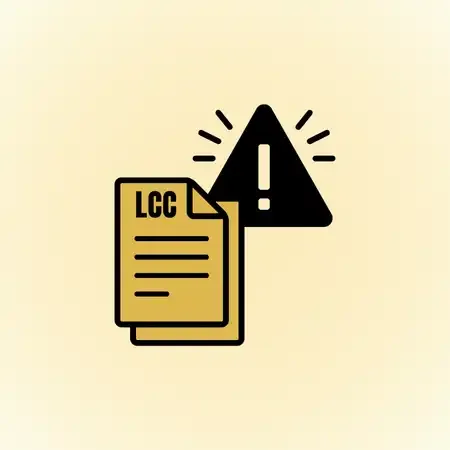Using LLCs to Protect Real Estate from Personal Liability
DK Law Group banner showing a hand stopping falling wooden blocks from hitting a model house, symbolizing shielding property from personal liability.
When you own property in your own name, you might not think twice about the risks. But the truth is, one unexpected lawsuit can put far more than your rental income in jeopardy. It can put your personal savings, your retirement, even your home on the line.
Think about it this way: you’ve worked hard to build a rental portfolio here in Maryland. Everything is running smoothly until one day a tenant slips on an icy walkway, hires a lawyer, and sues. Suddenly, what started as a simple investment has opened the door to personal financial exposure.
That’s why so many real estate investors turn to LLCs.
A Limited Liability Company (LLC) creates a legal barrier between you and your properties. Instead of carrying the weight of potential lawsuits personally, your LLC does the heavy lifting. And beyond liability protection, an LLC can also make life easier when it comes to estate planning and taxes.
Whether you’re renting out a single-family home or managing a portfolio of properties, setting up an LLC isn’t just a smart move, it’s a proactive step toward protecting the wealth and security you’ve worked so hard to build.

Why LLCs Matter for Real Estate Investors
An LLC is a separate legal entity. It can hold property, sign contracts, and even be sued. All without dragging your personal finances into the equation.
Here’s the key:
If you own property in your name and get sued, all your personal assets may be exposed.
If the property is owned by an LLC, generally only the LLC’s assets are at risk.
That separation, sometimes called the “corporate veil” is what makes LLCs so valuable to real estate investors. And in Maryland, forming an LLC is relatively simple and cost-effective with the right guidance.
You can register your business online at Maryland Business Express.
What Types of Property Should Be in an LLC?
Many investors assume LLCs are only for big landlords or developers, but that’s not the case. In Maryland, property owners often use LLCs for:
Single-family rental homes
Duplexes and triplexes
Short-term rentals (Airbnb, VRBO)
Commercial buildings
Undeveloped land
If the property could expose you to liability and almost all rental or investment properties can, an LLC is worth considering.
Learn more about how to protect your short term rentals. Read “Key Strategies for Protecting Your Rental Properties.”

Benefits of Holding Real Estate in an LLC
1. Liability Protection
When properly formed and maintained, an LLC helps shield your personal assets from lawsuits tied to rental property.
Important Note: Liability protection is not absolute. If you personally guarantee a loan, commit fraud, or are personally negligent (for example, failing to clear ice from a walkway), you can still be held personally responsible.
2. Estate Planning Flexibility
LLC membership interests can be transferred or placed into a trust, making inheritance and succession smoother for your family.
3. Tax Options
LLCs default to pass-through taxation, but owners can elect to be taxed as an S-Corp or C-Corp if it’s more beneficial. This flexibility makes tax planning easier.
4. Professional Image
Keeping your rental business separate from your personal life signals credibility to tenants, lenders, and contractors.
5. Some Privacy
Properties held in an LLC are titled under the company name. While Maryland requires public disclosure of the LLC and resident agent, this structure still provides a modest layer of separation.
Special Considerations for Maryland Property Owners
Maryland law adds a few unique points investors should know:
No Franchise Tax: Unlike some states, Maryland doesn’t charge a separate franchise tax on LLCs. However, you must file an annual report and personal property return to stay in good standing.
Continuity: An LLC doesn’t dissolve if an owner dies or exits. The operating agreement controls what happens next, reducing probate complications.
Mortgage Issues: Moving mortgaged property into an LLC may trigger a “due on sale” clause. Always check with your lender first.
Insurance Costs: Expect to carry landlord or commercial insurance, which may be more expensive than a standard homeowner’s policy.
Compliance: To maintain liability protection, you must treat the LLC as a business — separate bank accounts, accurate records, and timely filings are essential.

What Are the Risks or Downsides?
Like anything, using an LLC has trade offs. Maryland property owners should be aware of:
Mortgage Challenges
Transferring a mortgaged property into an LLC might trigger a “due on sale” clause unless handled carefully. In some cases, lenders may call the loan due, or require refinancing under a commercial loan.
Higher Insurance and Costs
Commercial insurance policies for LLCs may cost more than individual policies. You may also need to carry landlord insurance, general liability insurance, or umbrella coverage depending on your setup.
Learn more about insurance by reading: “Top 5 Policies Every Property Owner Should Have”
Annual Fees and Compliance
Maryland LLCs must file annual reports and pay a state fee to remain in good standing. Failure to comply can result in the LLC being forfeited, which would strip away its liability protection.
You Must Keep Things Separate
If you mix personal and LLC finances, courts can sometimes ignore the LLC and hold you personally liable: a legal concept called “piercing the corporate veil.”
Even with an LLC in place, maintaining the right insurance is essential. Think of the LLC as a shield. It helps protect your personal assets, but it is not a substitute for landlord, liability, or umbrella coverage.
Should You Use One LLC or Many?
It’s possible to place multiple properties into a single LLC. But here’s the catch: if one property faces a lawsuit, every property in that LLC could be exposed.
A stronger strategy is to:
Place each property in its own LLC, or
Create a holding company that owns multiple LLCs beneath it.
Important for Maryland investors: Unlike some states, Maryland does not authorize Series LLCs. That means the multiple-LLC or holding-company structure is the safest way to maximize protection here.
What is the difference between an LLC and Series LLC? Read “LLC vs. Series LLC” to learn more.
How Do You Set Up an LLC in Maryland?
Forming an LLC in Maryland involves:
Choosing a name for your LLC
Filing Articles of Organization with the State
Appointing a resident agent (someone who can receive legal papers)
Drafting an Operating Agreement
Getting an EIN (Employer Identification Number) from the IRS
Opening a separate bank account
(Optional but recommended) Transferring your real estate title to the LLC via a deed
Be careful when transferring property: you may need lender approval, and it could trigger transfer taxes if not structured properly. In Maryland, deeds into an LLC may also trigger recordation and transfer taxes unless an exemption applies (for example, when there’s no change in beneficial ownership).
You can also check out detailed steps at The People’s Law Library of Maryland.
LLCs Aren’t Just for Big Investors
Whether you own one rental or ten, using an LLC in Maryland is a powerful tool to reduce personal risk, manage taxes, and protect your legacy. The key is setting it up the right way and making sure you follow all legal formalities.
At DK Law Group, we help Maryland real estate investors form, maintain, and protect LLCs that support long term wealth building. If you’re ready to take the next step, we are here to guide you.
Need help forming an LLC to protect your real estate? Click here and contact us for a personalized consultation.
Disclaimer
This article is for informational purposes only and does not constitute legal advice. Every situation is unique. For advice on your specific circumstances, please consult a qualified Maryland attorney.
LLC Quiz: Test Your LLC Knowledge
Quick 5‑question quiz. Learn as you go—answers include short explanations.

